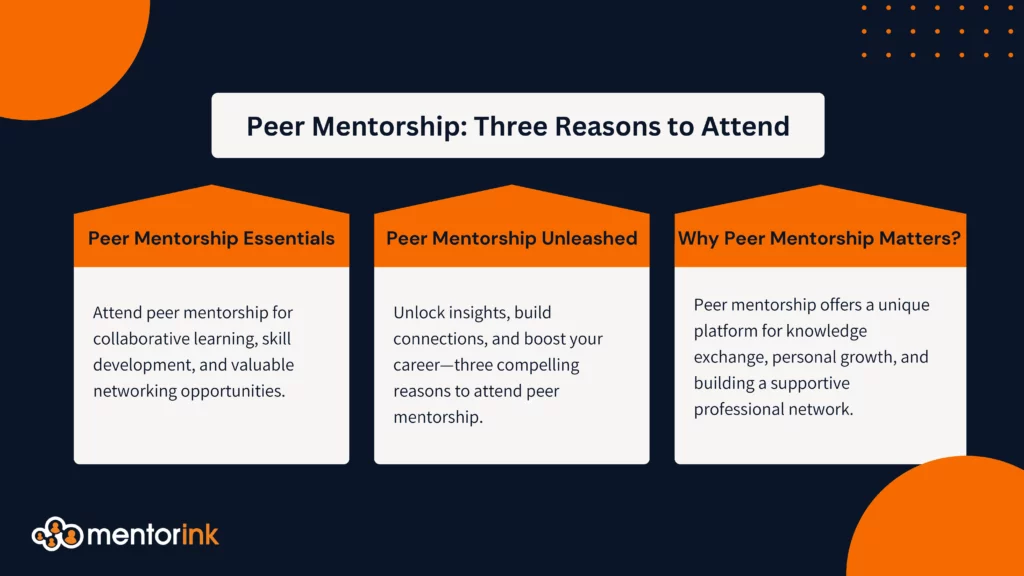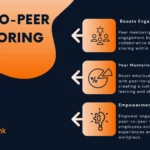
Mentorship has an important role in professional and personal growth. It’s an effective way for people to learn thoughts, knowledge, and skills from those who came before them. Within the traditional mentoring structures, peer mentoring appears as a complex and more popular model.
This paradigm takes use of the potential of reciprocal connections, in which people of comparable positions share information and grow together. Unlike traditional mentorship’s hierarchies, peer mentoring thrives on an egalitarian interchange of ideas, creating a one-of-a-kind atmosphere for mutual growth and understanding.
Definition of Peer Mentoring
Peer mentoring is one specific type of mentorship distinguished by the nature of those who participate. In peer mentoring, both the mentor and the mentee are usually at similar points in their professional lives or academic pursuits, resulting in a partnership focused on equality rather than hierarchy.
The peer-to-peer mentoring relationship promotes a collaborative learning experience in which both sides may provide and receive assistance and support. The core of a peer mentoring program is its capacity to promote personal and professional growth in a more relaxed, relevant, and reciprocal setting.
The divide between teaching and learning disappears in this setting, resulting in a symbiotic connection in which both peers benefit from the interchange of experiences, difficulties, and accomplishments.
Benefits of Peer Mentoring
Peer mentorship programs provide numerous benefits which assist an individual progress and develop. These advantages go beyond the learning of new knowledge, encouraging personal, professional, and social development.
Personal and Professional Growth
Peer mentoring makes many contributions to the personal and professional development of individuals in accordance with a specific purpose.
- Skill Enhancement: Peer mentorship serves as a stimulus for developing skills. It provides a venue for the exchange of important skills such as leadership, communication, time management, and technical knowledge pertinent to certain disciplines. This reciprocal relationship helps both mentor and mentee enhance their skills, typically resulting in rapid personal and professional development.
- Increased Confidence and Self-Efficacy:The encouraging characteristics of peer mentoring relationships enhances individual trust and self-efficacy. Consistent relationships, comments, and support from a peer mentor assist mentees to believe in their talents, make more confident judgments, and overcome obstacles more successfully.
- Career Development and Networking:Peer mentorship delivers new insights on career growth, industry standards, and possibilities. Mentors and mentees can discover new professional paths, avoid prevalent mistakes, and get access to secret employment markets by sharing their experiences. Furthermore, these ties frequently result in the growth of professional networks, which are quite useful in today’s linked world.
Enhanced Learning Experiences
- Exposure to New Perspectives and Ideas:Engaging with a peer from a similar or different background brings up new perspectives and ideas, fostering innovation and creativity. This diversity of viewpoints challenges preconceived notions, allowing both sides to think critically and seek innovative solutions to issues.
- Supportive Learning Environment: The reciprocal character of peer mentorship provides a safe environment for learning and experimenting. Without the fear of being judged, mentees are more inclined to ask questions, express concerns, and acknowledge mistakes. This setting encourages deeper learning and more profound personal reflection.
- Adaptability and Flexibility: A peer mentoring partnership requires both individuals to adjust and be adaptable. This flexibility is a useful ability for both personal and professional settings because it fosters resilience and the capacity to handle change successfully.
Strengthened Support Networks
Individuals who participate in peer mentoring can have the chance to meet many individuals related to their field, academic or business, and expand their network.
- Building Stronger Professional Connections: Peer mentoring enables the establishment of solid professional connections that extend beyond the mentoring relationship. These networks may offer potential support, advice, cooperation, advocacy, and mentoring possibilities.
- Enhanced Sense of Belonging and Community: Peer mentorship develops a strong sense of belonging and community by bringing people together who have similar goals, problems, or experiences. This emotional support is especially beneficial during transition stages, such as beginning a new work, furthering your education, or managing career transitions.
- Mutual Support and Encouragement:Unlike standard mentorship, peer mentoring involves reciprocal support. This bidirectional flow of encouragement and guidance not only deepens the mentoring relationship, but also lays the groundwork for long-term professional support networks.
Peer mentoring is known for its many contributions in business life. For detailed information about the benefits of peer mentoring in business life, you can check out our blog post “How Peer-to-Peer Mentoring Can Boost Employee Engagement”.
Differences between Peer Mentoring and Traditional Mentorship Programs
Peer mentoring, which is quite popular among mentoring programs, has different features and functioning than traditional mentoring, especially in the development of the mentee. Peer mentoring is different from traditional mentoring in terms of functioning, programme structure and emotional aspects.
Peer mentorship is based on mutual respect and equality. Both mentees and mentors are frequently at similar phases in their professional or academic lives, resulting in a more comfortable and reciprocal connection. This relationship permits open dialogue, shared experiences, and shared development. For more detailed information about the importance of peer mentoring in academic life, our article “Peer Mentoring Programmes in Higher Education” would be informative for you.
Traditional mentoring, on the other hand, frequently consists of a more experienced individual instructing a less experienced mentee. The connection is frequently hierarchical, with the mentor offering wisdom, guidance, and direction. While immensely useful, this dynamic might occasionally restrict the mentee’s willingness to share challenges or seek assistance.
Peer mentorship programs are generally more customizable to the requirements and schedules of the participants. This comfortable structure lets a mentoring relationship develop spontaneously, concentrating on similar interests and goals.
In traditional mentorship such programs usually have a more formal structure, including stated goals, periodic meetings, and established lengths. The systematic technique can give a clear foundation for development, but it may not be as spontaneous and adaptable as peer mentorship.
Peer mentoring is a form of mentoring in which the mentor and mentee work together to set goals, with the purpose of achieving shared objectives. It is possible for outcomes to include the development of specialized skills, the enhancement of professional networks, and the growth of both parties involved.
When it comes to traditional mentoring, the goals are often oriented upon the growth of the mentee, with the mentor steering the process toward the achievement of particular professional or personal goals. A greater priority is placed on the mentee’s outcomes, which may include work development, the learning of skills, and professional networking.
Stronger social and emotional support is often provided by these partnerships because of the peer-to-peer aspect. Because of the experiences they share, mentors and mentees are better able to provide support and understanding in addition to expert guidance.
Traditional mentoring often focuses more on professional growth and direction, however it can also include social and emotional support. Mentors are more commonly thought of as guides or advisors than as confidants among their mentees.
What are the Phases of Peer Mentoring?
The peer mentoring programme consists of certain periods as in other mentoring programmes. Each phase is important in terms of proper development.
- Beginning
The beginning of this process entails linking mentors and mentees based on common interests, aspirations, or histories. The emphasis is on making a connection and developing empathy. Early sessions may focus on getting to know one other, addressing mutual expectations, and creating first goals for the mentoring relationship.
The two groups agree on the structure of their contacts (frequency, manner of communication, and so on) and set goals for the mentoring relationship. This clarity provides a good basis for successful mentorship.
- Progression
During this phase, both the mentee and the mentor are actively involved in the learning process. This might involve sharing and discussing resources, addressing problems collaboratively, and offering comments on progress. The focus is on attaining the objectives established at the start of the mentoring relationship.
As the relationship progresses, mentors and mentees may need to modify their objectives or tactics in response to new information or changing circumstances. This phase emphasizes flexibility and adaptation, ensuring that the mentoring connection stays relevant and helpful.
- Conclusion
This phase includes reflecting on the mentoring journey, analyzing goal attainment, and sharing the growth experiences of both mentor and mentee. It’s an opportunity to celebrate triumphs and reflect on lessons learned. Depending on the agreed-upon framework, the mentoring relationship may terminate formally or shift into a less formal, continuous link. Regardless, appropriate closure entails recognizing the importance of the connection and the progress accomplished.


